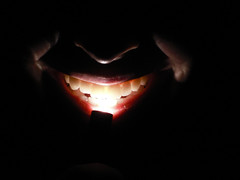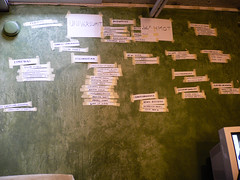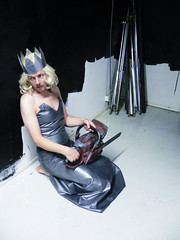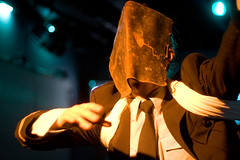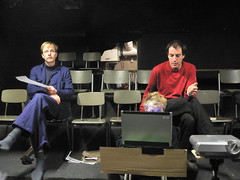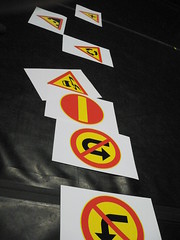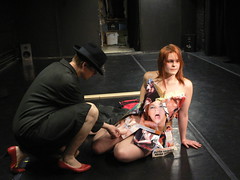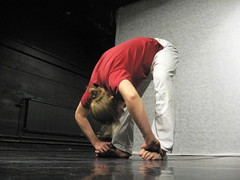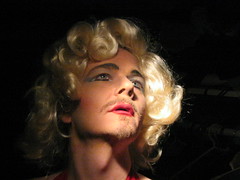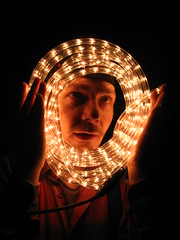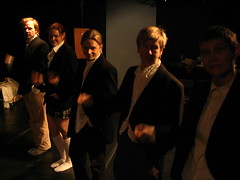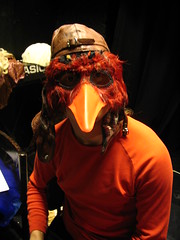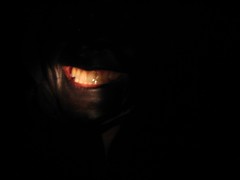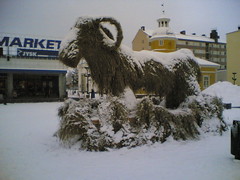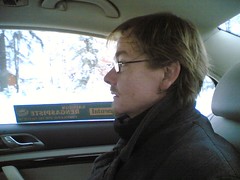First week of actually rehearsing Alice ad infinitum. What's sort of on the menu at the moment is that we've done a year and a half of developing ideas and characters and texts and scenes and situations, none of which are in any way causally related to each other or form any kind of plot, and now it's time to select the lucky winning content and string it together to form something.
It appears we're telling a story, but I mean that in the Lynchiest possible way, as in we're telling a story in a similar kind of way that Inland Empire tells a story. I can't even say if it's close to that or not at this point; it's so loose.
The first day Eki showed up with a 78-page script, which we read through, an activity that made us all giddy because it's not something that usually ends up being part of the process at N&H. The second day we worked a couple of beginning scenes, and that was fairly easy. The third day all hell (okay, small hell) broke loose with at least most of the actors. I wasn't able to get a hold of anything and was, in very good form, blaming the others for not giving me what I needed. Even when I realized that that was what I was doing, it was really hard to curb it.
Sometimes I wonder if, as performers, some of us are almost too attuned to each other. I mean, it's immediately clear to me when either Juha or Akseli are having even a 10% off day, and I know that they know when I'm not having a good day either, often before I'm even aware of it myself. Usually this is part and parcel of a very close working relationship, but it means you share a lot of the negative as well as the positive. Basically, we were doing a scene where everyone was together (not something we'd done before), and the characters were more from the classical Alice in Wonderland universe, including a dreadfully stereotypical Alice stereotyped by yours truly. We were lost and unable to give each other anything to go with. It wasn't pleasant.
But it's gone through that and has come out the other side. It's weird that we didn't really have a linear story or a main character before, and now at least in the first act we have an Alice, and her whole way of being is somewhere between the aforementioned stereotype, blank slate, and whatever else pops into my head. It's been very uncomfortable, actually, standing around trying to feel like I look like an Alice, and automatically my body was reverting to some kind of stiff caricature. Eki mentioned today that my body was way more interesting when I was just standing on stage, before I started "acting," and I realized that that zone of awful discomfort was where I was really supposed to be. This didn't make it any more comfortable at all, it just meant that if I felt kinda awful in a lost and squirmy sort of physical way, I was probably doing something right.
These are the kinds of realizations in acting that make no rational sense, and are probably not interesting to read about unless you're going through it yourself. I know I had teachers in school who tried to encourage us to find the discomfort and work with it, but the funny thing is that usually it's so glaringly strong and obvious that you can't "find" it. You just put on an attitude, feeling significantly better in the comfort department except that you know that what you're doing is completely fake and you somehow can't shake the feeling that it's not helping the piece at all, but don't know what else to do. But not knowing what to do is a very rich source.
I remember reading in Anne Bogart that stereotypes exist for a reason, and that for many actors it's a good thing to run into stereotypes instead of fleeing them, because you'll have to go through it anyway to find a way of doing a character that's actually got your real stamp on it. This worked for me in Kalevala dell'Arte (when we were building the piece, Carlo Boso called my acting "Disney commedia") and I'm inclined to think it could be a necessary phase for something like Alice. Alice is a world of stereotype, archetype, classic heroine herself. She's got more layers put on her than a Black Forest cake.
And the panic comes from the fact that three weeks ago we were happy as Larry to be playing around with perverse rabbits and queens with chainsaws, and all of a sudden there's a "real" Alice, a real Rabbit, Caterpillar, Mad Hatter, and Dormouse. And it's funny how thrown we were by trying to jump in and getting it all wrong, when we should have known that this would fuck us up, but we were still surprised.
This has to be one of the things I keep noticing these days: how I really, really keep getting surprised by things that shouldn't surprise me any more. I wonder if my artistic process is horribly inefficient. Or if that could be a good thing.
So today, here comes another loop - I've started to take on Alice in my own thinking, which is at once really encouraging and a bit sickeningly worrying. You see, Alice is confused at every turn and her identity and reality put into question. I got a direction that I completely misunderstood, and when I finally got on the boat with the others, saying, "But..what do you mean?... Oh! Now I get it," Juha burst out, "That was an Alice reaction." And from there I started to feel that Alice is more like a kind of behaviour, a state of confusion, the activity of constantly negotiating what is real and what is not, and not like any one little girl. But then I noticed I was answering questions directed at me, the actor, as Alice, the character; or as "myself through the filter of Alice the behaviour," and I started all at once to lose the sense of who exactly was answering the question. All of a sudden I didn't know where the thoughts were coming from, or to whom the question was addressed. And right after that, Juha's William S Burroughs line "Madness is confusion of levels of fact...Madness is not seeing visions but confusing levels," just about made my brain shiver.
Which is great, because this is what the heart of the project was always about: where does a character end and where does the actor begin? What are the limits of personality? Is psychology infinite?
It's one thing to be in a very physical or technically demanding performance and have to monitor yourself all the time; it's another thing entirely to do something more akin to performance art, where there is no representation or confusion of levels but you can be very attuned to your own emotional state or whatever; it's yet another thing to have the experience where, for perhaps a moment or two, you get the sensation of having merged with a character, or you feel a character start to melt with you, or you momentarily forget what you're doing, or you notice in your real life that you're picking up a character's way of responding to situations. Traditionally that's quite Method. Somehow I have the feeling that it relates more to naturalistic acting than to anything else. But whether or not it makes for a good performance, it is a real experience for the performer. I think most actors who come from a more "physical" school aren't so interested in pinpointing the place where their character separates from their own personality because that's just not terribly relevant, but for any devoted Method actor, this should be a very rich place of study, no? To try to discover what nuances make you tick, in order to make another, created personality tick in a very lively way?
I'm not making a judgement call on which kind of acting is better; obviously, there's a time and place for everything. And Eki's style isn't naturalistic at all; he uses the term "transparent acting," which I kind of have to think about a bit more before expanding on it. But now what I find interesting is that I'm consciously noticing this "melting" as a part of the process. What would happen if you could play with that even more? Consciously? With a great deal of control? Can anyone control that kind of thing? What part of me is Alice, and to what extent is Alice in everybody? To what extent am I in everybody, or everybody in me? Should I, in this performance, constantly be looking for the spot where Alice begins--is that the key to acting this time?
Showing posts with label juha. Show all posts
Showing posts with label juha. Show all posts
Friday, October 19, 2007
Monday, September 10, 2007
Welcome back, Alice
Time to get back into Alice ad infinitum.
We've been trying on each other's characters and the results are terribly fun. It's somehow very satisfying to dress up as your colleague would do and try to use their character rules to build your own thing. The only problem is that if you have the same pants, you can't both be wearing them at the same time.
At the moment the main tasks are rather space and time related. As in, building new areas in the Höyhentämö (our space on Korkeavuorenkatu in Helsinki), putting up curtains, thinking about mirrors and lights, and then organizing things in order, some kind of dramaturgy, for lack of a better word. If it's not a drama, what kind of urgy are we supposed to have? We have a whole slew (and I mean a really really large number) of characters, and thankfully a smaller number of places where they exist, including places like New York, Wonderland, outer space, and in the mirror. We're still building new characters but none of them really has anything like a story attached to them, or a through-line. Everyone's leaving all the time, never to return. They kind of have encounters or situations, and then that's it. Poof, they're gone.
Which is not to say, I think, that the point is to not give an audience some threads to follow. I can't really say what these threads are like, but they probably will have something to do with space. Not just outer space, but where the scenes are set, where things happen in our imagination, and where things happen physically on the stage and in the whole performance area. Having something consistent is rather necessary for any kind of (even post-narrative-type) threads to get their weave on. So we'll probably have, say, a few scenes in space, a few scenes in the Looking Glass land, and so on. And if characters come back, that also helps.
In Beyond the Red Room, a piece from 2004 at Naamio ja Höyhen and also directed by Eki Vuori, there was a small space with rather tight and simple rules. Colours (created by light) indicated what kind of a world the audience was in. It wasn't the only indication, but it was a consistent throughline, and it took me many viewings of the piece (I ran lights, or colours if you like) to actually clue in to the logic. The more inconsistencies you have in a piece, the more an audience appreciates a strong, simple throughline. Films like Mullholland Drive operate with these principles. MH is disorienting enough to keep you from hoping after a watertight story, but it's not so disjointed that you can't follow or get involved in what's going on. I rather think that complete anarchy on the stage is annoying and doesn't give an audience all that much aside from the potential for a few brilliant moments. We're people. We need something to hang on to while we're shown something beautiful.
On the other hand, I'm also kind of aware of the fact that me even discussing the process in pieces like Elektra and Alice sounds a bit stupid from time to time. I don't want to explain things away, obviously, but when I say "Filthy Rabbit" I have a very clear idea of what that is and how it got into the performance, but you peeps don't. Or if I talk about Looking Glass Land or "Me-ness" in the context of this show... I feel a bit idiotic, as I know I'm not really communicating, but I just feel I have to carry on like that. I've noticed in devising theatre that some kind of common language is always developed. A group will never be able to work exactly the same way as they did last time, because the people have changed and the aims of the work have changed. So we make stuff up as we go along and because we also need to talk about it, we name it when we make it up. Which is fine for those of us working on the thing itself, but woe to anybody who has to listen to me talk about it. :)
Characters have speeches, but they're not terribly fixed. Many of them have even only been improvised once, scribbled down, maybe gone over a couple more times if they're lucky, with a bit of feedback, and that's pretty much where they are. The all-out freshness even reminds me of working with clown: you have your character's basic outline of behaviour, and then you simply pay attention to (and meticulously, lovingly, gratefully capitalize on) all the accidents that start to happen as soon as you present the character.
And the clothes, the makeup: they're irresistable. When trying out Akseli's filthy rabbit the other day, I started out all business: calmly and rationally get the costume, find the makeup, backcomb the hair, consider what this character will be like, and I noticed that as I was putting the finishing touches on the makeup, I was already in character. I was moving differently, doing my businesslike business with a messy and playful flair that was really for nobody but myself. Or was it for the character? What happened? Why is it that the simple act of putting on clothes can change how we are so easily and completely? I know I haven't explained it to make it nearly as interesting as I find it, but the thing is that some costumes don't really work. You can feel that they don't fit, there's no place for this thing, and you're just turning on a character from your own hard work. But then you get a costume that just starts to turn you on instead, unlocking itself gradually as you add more elements, and it's not work to do this character. It is simply the way you move, talk, and act to match the clothes.
I know I mentioned this before in an earlier post. I wanted to come back to it because it showed up again so strongly when we tried on each others' characters. And it's a fascinating question, when you think that actors can spend their entire lives training physically and vocally, practicing and thinking endlessly about a role, even rehearsing for weeks or months in rehearsal clothes, not a costume at all, and then an experiment like this comes along and makes you wonder about your previous rehearsal process. Mind, I can also sense that I'm much more sensitive to whether characters switch themselves on or whether I'm working to bring them out, because I happen to be paying attention to the process.
I'm aware that after 10 years of training, this may sound hopelessly naive. Just imagine as you wake up one day and you start to notice the mechanics of the process by which you move from sleeping to awake, and from then on you keep finding yourself waking up from time to time and noticing something new about that process, until eventually you can't wake up without observing yourself.
We've been trying on each other's characters and the results are terribly fun. It's somehow very satisfying to dress up as your colleague would do and try to use their character rules to build your own thing. The only problem is that if you have the same pants, you can't both be wearing them at the same time.
At the moment the main tasks are rather space and time related. As in, building new areas in the Höyhentämö (our space on Korkeavuorenkatu in Helsinki), putting up curtains, thinking about mirrors and lights, and then organizing things in order, some kind of dramaturgy, for lack of a better word. If it's not a drama, what kind of urgy are we supposed to have? We have a whole slew (and I mean a really really large number) of characters, and thankfully a smaller number of places where they exist, including places like New York, Wonderland, outer space, and in the mirror. We're still building new characters but none of them really has anything like a story attached to them, or a through-line. Everyone's leaving all the time, never to return. They kind of have encounters or situations, and then that's it. Poof, they're gone.
Which is not to say, I think, that the point is to not give an audience some threads to follow. I can't really say what these threads are like, but they probably will have something to do with space. Not just outer space, but where the scenes are set, where things happen in our imagination, and where things happen physically on the stage and in the whole performance area. Having something consistent is rather necessary for any kind of (even post-narrative-type) threads to get their weave on. So we'll probably have, say, a few scenes in space, a few scenes in the Looking Glass land, and so on. And if characters come back, that also helps.
In Beyond the Red Room, a piece from 2004 at Naamio ja Höyhen and also directed by Eki Vuori, there was a small space with rather tight and simple rules. Colours (created by light) indicated what kind of a world the audience was in. It wasn't the only indication, but it was a consistent throughline, and it took me many viewings of the piece (I ran lights, or colours if you like) to actually clue in to the logic. The more inconsistencies you have in a piece, the more an audience appreciates a strong, simple throughline. Films like Mullholland Drive operate with these principles. MH is disorienting enough to keep you from hoping after a watertight story, but it's not so disjointed that you can't follow or get involved in what's going on. I rather think that complete anarchy on the stage is annoying and doesn't give an audience all that much aside from the potential for a few brilliant moments. We're people. We need something to hang on to while we're shown something beautiful.
On the other hand, I'm also kind of aware of the fact that me even discussing the process in pieces like Elektra and Alice sounds a bit stupid from time to time. I don't want to explain things away, obviously, but when I say "Filthy Rabbit" I have a very clear idea of what that is and how it got into the performance, but you peeps don't. Or if I talk about Looking Glass Land or "Me-ness" in the context of this show... I feel a bit idiotic, as I know I'm not really communicating, but I just feel I have to carry on like that. I've noticed in devising theatre that some kind of common language is always developed. A group will never be able to work exactly the same way as they did last time, because the people have changed and the aims of the work have changed. So we make stuff up as we go along and because we also need to talk about it, we name it when we make it up. Which is fine for those of us working on the thing itself, but woe to anybody who has to listen to me talk about it. :)
Characters have speeches, but they're not terribly fixed. Many of them have even only been improvised once, scribbled down, maybe gone over a couple more times if they're lucky, with a bit of feedback, and that's pretty much where they are. The all-out freshness even reminds me of working with clown: you have your character's basic outline of behaviour, and then you simply pay attention to (and meticulously, lovingly, gratefully capitalize on) all the accidents that start to happen as soon as you present the character.
And the clothes, the makeup: they're irresistable. When trying out Akseli's filthy rabbit the other day, I started out all business: calmly and rationally get the costume, find the makeup, backcomb the hair, consider what this character will be like, and I noticed that as I was putting the finishing touches on the makeup, I was already in character. I was moving differently, doing my businesslike business with a messy and playful flair that was really for nobody but myself. Or was it for the character? What happened? Why is it that the simple act of putting on clothes can change how we are so easily and completely? I know I haven't explained it to make it nearly as interesting as I find it, but the thing is that some costumes don't really work. You can feel that they don't fit, there's no place for this thing, and you're just turning on a character from your own hard work. But then you get a costume that just starts to turn you on instead, unlocking itself gradually as you add more elements, and it's not work to do this character. It is simply the way you move, talk, and act to match the clothes.
I know I mentioned this before in an earlier post. I wanted to come back to it because it showed up again so strongly when we tried on each others' characters. And it's a fascinating question, when you think that actors can spend their entire lives training physically and vocally, practicing and thinking endlessly about a role, even rehearsing for weeks or months in rehearsal clothes, not a costume at all, and then an experiment like this comes along and makes you wonder about your previous rehearsal process. Mind, I can also sense that I'm much more sensitive to whether characters switch themselves on or whether I'm working to bring them out, because I happen to be paying attention to the process.
I'm aware that after 10 years of training, this may sound hopelessly naive. Just imagine as you wake up one day and you start to notice the mechanics of the process by which you move from sleeping to awake, and from then on you keep finding yourself waking up from time to time and noticing something new about that process, until eventually you can't wake up without observing yourself.
Labels:
acting,
alice ad infinitum,
devising,
eki,
juha,
naamio ja höyhen,
performance,
rehearsal,
theatre,
training,
workshop
Sunday, May 27, 2007
This is rehearsing? Ah ja...
Labels:
aarni,
akseli,
alice ad infinitum,
eki,
juha,
meditation,
performance,
rehearsal,
video,
virpi,
workshop
Thursday, March 29, 2007
Merde
It's opening night. I just picked up my notebook and thought, because every once in a while I can be frivolous, I'd share some of my notes from the last two runthroughs. Apparently I need to remember:
- pick up one of the cloths if no monkey blindfold
- tie yr damn shoelaces
- he's got a gun
- monkeys keep going, back to suitcase wild energy
- exit on humiliation
- cleaning
- no scissor gesture
- black is the colour immediately. no flowers
- bang them in the water
- silent emergency
- ophelia drowning fixed by going back w/ weight, turning R leg out, hands frozen out. sit on L leg
- just open the baby
- suitcase malfunctions
- davide needs a finger for akseli
Labels:
acting,
akseli,
davide,
devising,
here speaks elektra,
juha,
performance,
theatre
Saturday, February 17, 2007
Six weeks to Elektra
"This is your captain speaking...
I forgot what I was going to say."
So we're working now, about seven hours a day including break, until the show opens. The material is starting to gather form but it's still loose enough that anything can happen, and still doubtful enough to throw us (actors, probably director too but he doesn't show it so much in front of us) into wild rants of wtf are we doing here. This is like: the joy of devising.
Some of our elements include:
The previous week was our last "workshop" session, tomorrow marks the end of our first week of rehearsals proper. During the workshops I still had a day where I felt absolutely awful about the whole project (for reasons that are not clear even to me), but it seems that the feeling was some kind of entity itself, hanging around in the cellar air and infecting each one of us one day at a time. I have a feeling it's again just one's own artistic fear or ego or what-not making a mountain out of a molehill, where you start to question what the hell you're doing in this project and why does it have to, have to be that way when this way would be far superior, &c. I suspect what's really going on in times like those is that you just really, really secretly want the show to be great and you're building up an arsenal of excuses in case it isn't, so you won't have to go anywhere near your own personal soul's worth when your heart breaks. Maybe that's extreme. Well. It's been part of this process for sure. But this week's been an absolute giggle-fest (from hell, from Davide's POV sometimes). We've got comedy coming out the wazoo, and the project is so much fun it barely feels like Elektra.
But a porn dress! How do you go wrong? Aside from the fact that I can't really move in it and that we need to build a new one every night, you can't go wrong at all!
At the moment the way we work is that the first hour is warmup and training exercises, which are either led by me (biomechanics and working on the etude) or Juha (afro warmup plus his choreography based on movements from our old show), plus a wee bit of work on singing. This is really hard to get through in an hour; I usually find that once you've warmed up the brain and the body sufficiently to do an etude at all, you've got ten minutes left. Which ten minutes, if you know the etude really well, is kinda sufficient since you'll kill yourself if you do it more than thrice in quick succession, but we're still hashing out the shifts of weight and the exact body positions, so it's a bit harried.
Oh, rewind. What's an etude? To make it an extremely short story, it's a training sequence developed for actors, in a similar vein as a kata would be in karate training: an exact sequence of movements to be executed over and over again, striving towards their perfection (which, being impossible, let's just say their improvement). You wouldn't ever use a kata in a fight: you would apply the principles you learn in it. It's the same with a biomechanical etude: you study the etude to learn, very deeply, the principles of balance, weight, mime, rhythm, breath, sensitivity, precision, and visual interest. It's not an aesthetic; it's like a barbell for your actor's body.
The shitty thing about studying biomechanics right now is that there's only a handful of people who teach it, a handful of people who use it, and they're really not in Finland at the moment. So unless I have time and money to travel to a workshop, it's kind of a self-study thing. The really brilliant thing about that is that with Juha and Akseli especially, I've taught them all I know and have quickly come to the end of my expertise, and so doing things like creating etudes for ourselves is an incredibly valuable way to challenge the principles.
And challenging the principles is, like, ridiculous. Here we are, four grown people arguing about the precise angle of a shoulder in a movement called "presenting the passport," and the angle of the shoulder really matters. Or we come up with a brillant movement only to analyze it and discover it's actually two movements, so in the interests of efficiency we have to modify its brilliant self. Or spending twenty minutes on whether a foot should be off the ground or not, and really going at it with ruthless logic. You learn an awful lot that way. So that's keeping me pretty darn happy, although you also have to truncate your learning somewhat when you're in a rehearsal situation where you actually have to produce some kind of show.
I think the fastest I've ever led the warmup was 30 minutes, and I pulled a leg muscle that day. It's amazing how long it takes us. On the other hand, we do have a lot of bits in the show so far where the idea is to push a movement beyond our capacity: to work towards complete loss of power or balance, for instance, and that requires pretty much going all out in a way that spells instant injury if your body isn't prepped like a greased pig. The choreography we made with traffic symbols is one of these. We created movements corresponding to the signs, but the movements had to be too difficult to perform properly every time—more like you stick it once every ten tries. While the movements themselves can be quite pretty, what's way, way more compelling to watch is the look on the actor's face as they will every cell in their body towards stability in a given impossible position, and it's fabulously entertaining when they crash.
What that has to do with drama per se, I can't really say. We're wondering ourselves what the dramaturgical topography is like in Here speaks Elektra, and not so much even like are we looking at a relief map or a political map or whatnot, but what the hell hemisphere is this? Is it drama, theatre, performance art, dance, dance theatre, physical theatre, does it matter as long as you can hold it together? Can you hold it together if you don't really know what it is?
By the way: we finally got a grant. Like, our first real one. We are unbelievably happy about this.
I forgot what I was going to say."
So we're working now, about seven hours a day including break, until the show opens. The material is starting to gather form but it's still loose enough that anything can happen, and still doubtful enough to throw us (actors, probably director too but he doesn't show it so much in front of us) into wild rants of wtf are we doing here. This is like: the joy of devising.
Some of our elements include:
- airports
- choreography to music as well as to traffic symbols
- a made-up biomechanical training etude called "emergency at the airport," which needs work
- a problem in dealing with stylized vs quotidien movement (i.e. when to use which and whether combining both at all will work)
- spanish tragicomedy (which is sorta like commedia pre-masks)
- a dress made out of a porn mag
- great electro soundtracks created from such sources as purring cats and a washing machine
- images, images, images, images... taped on the body, projected on the body or the set, taped to the wall; they're a total mess
- objects, objects, objects... another logistical mountain. What do you do with all the objects when you finish with them? Every single thing needs a solution. I now understand what I had thought was just a rather trendy "gradual pile-up of complete mess" stage design that seemed to be in a lot of shows that have a kind of kinship with performance art as well as theatre; they save themselves the headache of finishing with the objects.
- the order to develop a combined biomechanics and afro-dance warmup (!)
- seriously, these things just pile up
- The line "before rising to a new level of humanity, please read all instructions and comply with them"
- many beautiful moments and a lot of cheesy ones that need to (perhaps) settle into their stereotypes even deeper so they can become beautiful too
- Not really a clue as to what the costumes or staging are like
The previous week was our last "workshop" session, tomorrow marks the end of our first week of rehearsals proper. During the workshops I still had a day where I felt absolutely awful about the whole project (for reasons that are not clear even to me), but it seems that the feeling was some kind of entity itself, hanging around in the cellar air and infecting each one of us one day at a time. I have a feeling it's again just one's own artistic fear or ego or what-not making a mountain out of a molehill, where you start to question what the hell you're doing in this project and why does it have to, have to be that way when this way would be far superior, &c. I suspect what's really going on in times like those is that you just really, really secretly want the show to be great and you're building up an arsenal of excuses in case it isn't, so you won't have to go anywhere near your own personal soul's worth when your heart breaks. Maybe that's extreme. Well. It's been part of this process for sure. But this week's been an absolute giggle-fest (from hell, from Davide's POV sometimes). We've got comedy coming out the wazoo, and the project is so much fun it barely feels like Elektra.
But a porn dress! How do you go wrong? Aside from the fact that I can't really move in it and that we need to build a new one every night, you can't go wrong at all!
At the moment the way we work is that the first hour is warmup and training exercises, which are either led by me (biomechanics and working on the etude) or Juha (afro warmup plus his choreography based on movements from our old show), plus a wee bit of work on singing. This is really hard to get through in an hour; I usually find that once you've warmed up the brain and the body sufficiently to do an etude at all, you've got ten minutes left. Which ten minutes, if you know the etude really well, is kinda sufficient since you'll kill yourself if you do it more than thrice in quick succession, but we're still hashing out the shifts of weight and the exact body positions, so it's a bit harried.
Oh, rewind. What's an etude? To make it an extremely short story, it's a training sequence developed for actors, in a similar vein as a kata would be in karate training: an exact sequence of movements to be executed over and over again, striving towards their perfection (which, being impossible, let's just say their improvement). You wouldn't ever use a kata in a fight: you would apply the principles you learn in it. It's the same with a biomechanical etude: you study the etude to learn, very deeply, the principles of balance, weight, mime, rhythm, breath, sensitivity, precision, and visual interest. It's not an aesthetic; it's like a barbell for your actor's body.
The shitty thing about studying biomechanics right now is that there's only a handful of people who teach it, a handful of people who use it, and they're really not in Finland at the moment. So unless I have time and money to travel to a workshop, it's kind of a self-study thing. The really brilliant thing about that is that with Juha and Akseli especially, I've taught them all I know and have quickly come to the end of my expertise, and so doing things like creating etudes for ourselves is an incredibly valuable way to challenge the principles.
And challenging the principles is, like, ridiculous. Here we are, four grown people arguing about the precise angle of a shoulder in a movement called "presenting the passport," and the angle of the shoulder really matters. Or we come up with a brillant movement only to analyze it and discover it's actually two movements, so in the interests of efficiency we have to modify its brilliant self. Or spending twenty minutes on whether a foot should be off the ground or not, and really going at it with ruthless logic. You learn an awful lot that way. So that's keeping me pretty darn happy, although you also have to truncate your learning somewhat when you're in a rehearsal situation where you actually have to produce some kind of show.
I think the fastest I've ever led the warmup was 30 minutes, and I pulled a leg muscle that day. It's amazing how long it takes us. On the other hand, we do have a lot of bits in the show so far where the idea is to push a movement beyond our capacity: to work towards complete loss of power or balance, for instance, and that requires pretty much going all out in a way that spells instant injury if your body isn't prepped like a greased pig. The choreography we made with traffic symbols is one of these. We created movements corresponding to the signs, but the movements had to be too difficult to perform properly every time—more like you stick it once every ten tries. While the movements themselves can be quite pretty, what's way, way more compelling to watch is the look on the actor's face as they will every cell in their body towards stability in a given impossible position, and it's fabulously entertaining when they crash.
What that has to do with drama per se, I can't really say. We're wondering ourselves what the dramaturgical topography is like in Here speaks Elektra, and not so much even like are we looking at a relief map or a political map or whatnot, but what the hell hemisphere is this? Is it drama, theatre, performance art, dance, dance theatre, physical theatre, does it matter as long as you can hold it together? Can you hold it together if you don't really know what it is?
By the way: we finally got a grant. Like, our first real one. We are unbelievably happy about this.
Labels:
acting,
akseli,
biomechanics,
davide,
devising,
here speaks elektra,
juha,
meyerhold,
naamio ja höyhen,
performance,
rehearsal,
theatre,
warmup,
workshop
Tuesday, December 12, 2006
One point five rehearsals to go
I'm flying back to Canada for Christmas; I can't wait to finally meet my niece and see everyone I haven't seen for two and a half years. Just a couple more rehearsals before I go, of course. Stuff I'd like to expand on:
The Projects
Today's rehearsal is for Kalevala dell'Arte, mixing the Finnish epic with the Commedia dell'Arte style. The poetry is beautiful but none of us has a very rigorous approach to poetry (with my Shakespeare background, I seem to be the poetic text expert in the group and that's scary since I'm a total tenderfoot in the field). A few of us have a strong-ish background in Commedia, so that's at least a start. We have a musician, a dancer/choreographer, an acrobat, and a bunch of mask actors. So basically it's ambitious as hell and the training is daunting, but it could be a real hit.
Here speaks Elektra continues in the new year. We had a good discussion about why this particular last workshop segment was so difficult and painful when we all like the project and we all like working with each other. In some ways the content is responsible; you can't do a piece about torture and humiliation and expect it to have no effect on your mood whatsoever. Also we're working very personally and we keep finding that we distance ourselves from the work rather automatically, as a kind of protection. It's very frustrating to watch yourself shut down creatively in order to avoid some discomfort--you can really see it happening and have no idea how to not do it. I'm taking this as material; as a phenomenon that should be worked into the performance itself.
And then Akseli and Juha and I met on Sunday to discuss our upcoming project, with the working title Katsoin kun sinä katosit / I watched you disappear, which, if it happens in front of an audience, will happen next fall. The basic idea is for the three of us to work without a director. We have a common experience, we three, of things like butoh, biomechanics, modern dance, improvisation, and working with directors like Eero-Tapio Vuori, Atro Kahiluoto, Davide Giovanzana, Jani-Petteri Olkkonen, and choreographer Ken Mai. In a sense, their work has a unique combination in us, even though the directors themselves have little to no common artistic dialogue. And we want to crystallise what it is, exactly, that we know. How, exactly, we work as a group of actors, analysing what we have in common without having anyone else come in with new styles or ideas. To begin with, we're just planning workshops where we each take responsibility for a method/style/question and work with it for a couple of hours, and then another one takes a couple of hours, and after a few sessions we can say "I want to combine what you did with this exercise I did the other day and see what happens," and that's our beginning. We also have lots of general interest questions, from application of Laban's movement theories to the relationship between concentration in the actor and concentration in the audience, and the relationship between control and non-control between the performer and the performance. I mean, that's a start. I'm also interested in how people start to "become" each other when they work together a lot or hang out a lot or whatever. So that, in a nutshell of a nutshell, is the starting point for a project. We start training and research in January.
But first, it's back home for a bit of turkey and TLC!
The Projects
Today's rehearsal is for Kalevala dell'Arte, mixing the Finnish epic with the Commedia dell'Arte style. The poetry is beautiful but none of us has a very rigorous approach to poetry (with my Shakespeare background, I seem to be the poetic text expert in the group and that's scary since I'm a total tenderfoot in the field). A few of us have a strong-ish background in Commedia, so that's at least a start. We have a musician, a dancer/choreographer, an acrobat, and a bunch of mask actors. So basically it's ambitious as hell and the training is daunting, but it could be a real hit.
Here speaks Elektra continues in the new year. We had a good discussion about why this particular last workshop segment was so difficult and painful when we all like the project and we all like working with each other. In some ways the content is responsible; you can't do a piece about torture and humiliation and expect it to have no effect on your mood whatsoever. Also we're working very personally and we keep finding that we distance ourselves from the work rather automatically, as a kind of protection. It's very frustrating to watch yourself shut down creatively in order to avoid some discomfort--you can really see it happening and have no idea how to not do it. I'm taking this as material; as a phenomenon that should be worked into the performance itself.
And then Akseli and Juha and I met on Sunday to discuss our upcoming project, with the working title Katsoin kun sinä katosit / I watched you disappear, which, if it happens in front of an audience, will happen next fall. The basic idea is for the three of us to work without a director. We have a common experience, we three, of things like butoh, biomechanics, modern dance, improvisation, and working with directors like Eero-Tapio Vuori, Atro Kahiluoto, Davide Giovanzana, Jani-Petteri Olkkonen, and choreographer Ken Mai. In a sense, their work has a unique combination in us, even though the directors themselves have little to no common artistic dialogue. And we want to crystallise what it is, exactly, that we know. How, exactly, we work as a group of actors, analysing what we have in common without having anyone else come in with new styles or ideas. To begin with, we're just planning workshops where we each take responsibility for a method/style/question and work with it for a couple of hours, and then another one takes a couple of hours, and after a few sessions we can say "I want to combine what you did with this exercise I did the other day and see what happens," and that's our beginning. We also have lots of general interest questions, from application of Laban's movement theories to the relationship between concentration in the actor and concentration in the audience, and the relationship between control and non-control between the performer and the performance. I mean, that's a start. I'm also interested in how people start to "become" each other when they work together a lot or hang out a lot or whatever. So that, in a nutshell of a nutshell, is the starting point for a project. We start training and research in January.
But first, it's back home for a bit of turkey and TLC!
Labels:
acting,
akseli,
devising,
here speaks elektra,
juha,
kalevala dell'arte,
naamio ja höyhen,
performance,
rehearsal,
theatre,
training,
workshop
Wednesday, November 29, 2006
Here speaks Elektra, vol.II
Today's fun and games is the second round of workshops for Here speaks Elektra, an upcoming project at Naamio ja Höyhen with myself, Akseli Aittomäki and Juha Sääski on stage; Davide Giovanzana directing, and also including Virpi Byring, Maura Korhonen, and other designers in the mix; we haven't worked with everyone yet. It's an extension of the work we did for Opheliamachine way back in 2005, which means that it's based on ancient Greek chorus and Heiner Müller's Die Hamletmaschine, and this time we've shrunk the chorus and are looking more at the fifth act of HM; which begins with the line "Hier spricht Elektra." We've been focusing on ideas such as humiliation, torture, domination, and all kinds of stuff that makes you feel good at the end of the day.
Here's probably the most disturbing character I've ever met: Juha as Hamlet (as from die Hamletmaschine) who wants to be a woman. We just did some solo and duo work today with Davide, and my Ophelia/Gertrude had a hell of a time dealing with this bastard. Or rather, the disturbance was as much from O/G's inability to fight back as much as any aggression from Hamlet. Hamlet, in HM, wants to be a woman. An interpretation of this could be that he's systematically trying to rid himself of the parts that cause aggression, fighting, evil, and suffering. He ends up wanting to be a machine, with no pain, no thoughts. So we first had a fantastic dance from Juha here, alternating between war-waging, all-fucking movements and the delicate dance of a tragic lady Blanche. It was great; when he was masculine, I saw a man dressed in a woman's clothes. When he played feminine, I saw a woman dressed in a man's body. The clothes, I'm beginning to think, are a terribly important factor in an actor's (a person's?) psychology.
In Hamletmachine, Hamlet rapes his mother in a particularly brutal bunch of lines in the first act; or rather he talks about it but whether or not he actually does it is a matter of direction. He's little more than the embodiment of an uncontrollable violent urge, which is something I understood better after improvising with him today. And to me, Ophelia and Gertrude don't have physical power. It's just not part of my imagination of them. I've also never played a character who really couldn't just punch anybody's lights out (at least in a play where that kind of situation arises), so after improvising and basically having my character mocked and thrown about and mimed-violated, having no idea in my head at all where my supposed maternal/feminine power was supposed to be coming from and whether or not it could possibly hold any currency whatsoever against a Hamlet in this mood, I felt really distressed.
I've often been one of those actors who makes fun of actors who talk about their feelings a lot, but if you're a performer, you do work with them very closely from time to time and you do need to take your emotional responses seriously. You have to be able to step back and realize that you're not psychotic, depressed, angry, or a sex maniac, but your character is, and there is a difference. Sometimes it's easy to confuse your personality with a fantasy you've created. This is why some actors are (famously, almost cliched in a way) nervous wrecks.
The distress I felt comes not from anything that happened to me in the improvisation, but from some kind of weird empathy; the possibility that that situation could exist. Maybe not even for me, but for some woman (or man) somewhere. All the same, we experience emotions as if that thing has happened to us; we don't have any way of separating character-induced emotions from real life emotions, save the faculty to step back and analyse which one is which. The feeling of absolute powerlessness is very, very bad. It's also a very easy starting point for beautiful expression, because you simply cannot do anything, you have no effect on anyone, and the expression comes so easily because it cannot try to do or be anything other than itself. Loaded with powerlessness, a gesture can be wonderful.
What will be nice in the future is to see how Ophelia/Gertrude will turn this around, how the same powerless character will be able to hold all the cards over psycho-Hamlet. I'm not exactly sure how this is going to work, but I'm sure it should happen. She has something Hamlet will never have, and Hamlet wants that something.
Here's probably the most disturbing character I've ever met: Juha as Hamlet (as from die Hamletmaschine) who wants to be a woman. We just did some solo and duo work today with Davide, and my Ophelia/Gertrude had a hell of a time dealing with this bastard. Or rather, the disturbance was as much from O/G's inability to fight back as much as any aggression from Hamlet. Hamlet, in HM, wants to be a woman. An interpretation of this could be that he's systematically trying to rid himself of the parts that cause aggression, fighting, evil, and suffering. He ends up wanting to be a machine, with no pain, no thoughts. So we first had a fantastic dance from Juha here, alternating between war-waging, all-fucking movements and the delicate dance of a tragic lady Blanche. It was great; when he was masculine, I saw a man dressed in a woman's clothes. When he played feminine, I saw a woman dressed in a man's body. The clothes, I'm beginning to think, are a terribly important factor in an actor's (a person's?) psychology.
In Hamletmachine, Hamlet rapes his mother in a particularly brutal bunch of lines in the first act; or rather he talks about it but whether or not he actually does it is a matter of direction. He's little more than the embodiment of an uncontrollable violent urge, which is something I understood better after improvising with him today. And to me, Ophelia and Gertrude don't have physical power. It's just not part of my imagination of them. I've also never played a character who really couldn't just punch anybody's lights out (at least in a play where that kind of situation arises), so after improvising and basically having my character mocked and thrown about and mimed-violated, having no idea in my head at all where my supposed maternal/feminine power was supposed to be coming from and whether or not it could possibly hold any currency whatsoever against a Hamlet in this mood, I felt really distressed.
I've often been one of those actors who makes fun of actors who talk about their feelings a lot, but if you're a performer, you do work with them very closely from time to time and you do need to take your emotional responses seriously. You have to be able to step back and realize that you're not psychotic, depressed, angry, or a sex maniac, but your character is, and there is a difference. Sometimes it's easy to confuse your personality with a fantasy you've created. This is why some actors are (famously, almost cliched in a way) nervous wrecks.
The distress I felt comes not from anything that happened to me in the improvisation, but from some kind of weird empathy; the possibility that that situation could exist. Maybe not even for me, but for some woman (or man) somewhere. All the same, we experience emotions as if that thing has happened to us; we don't have any way of separating character-induced emotions from real life emotions, save the faculty to step back and analyse which one is which. The feeling of absolute powerlessness is very, very bad. It's also a very easy starting point for beautiful expression, because you simply cannot do anything, you have no effect on anyone, and the expression comes so easily because it cannot try to do or be anything other than itself. Loaded with powerlessness, a gesture can be wonderful.
What will be nice in the future is to see how Ophelia/Gertrude will turn this around, how the same powerless character will be able to hold all the cards over psycho-Hamlet. I'm not exactly sure how this is going to work, but I'm sure it should happen. She has something Hamlet will never have, and Hamlet wants that something.
Labels:
davide,
devising,
here speaks elektra,
juha,
naamio ja höyhen,
perversity,
rehearsal,
theatre
Wednesday, November 22, 2006
From Alice's conversations with the gods
On the last few days of Alice I, we spent considerably more time on theory than on character. Or rather, on characters fixated with parallel universe theory.
There was spaceship Alice, in which we dressed in white underwear and, sleeping in cyrogenic freeze, dreamt of butterflies (ref. the Chinese tale of the butterfly that dreams it is a man/man that dreams it is a butterfly), were woken up by the computer, felt a terrible cryogenic hangover, and, while brushing teeth in front of our individual mirrors, were informed that we were heading straight for a black hole. Officer Hubblefield (or Hilbertspace, nobody can ever tell one from the other) ends up being the first human black hole tourist. Stuff like this, at least stagingly speaking, has the ingenious simplicity of Star Trek: a mirror, toothbrush, and white underwear, and suddenly we're all in space. We even said it like that. "Hey guys, I'm in spaaaaace! Ooooooo! Do you read? OoooOOOoooo!"
Then there was the Max Tegmark quintet, who, in different Level 3 parallel universes (that's the quantum one, if you're interested), is a gambler. If he rolls a die and gets a six, Max Tegmark 2 gets a five, Max Tegmark 3 rolls a four, etc. We should be a sextet but were missing one suit. There is a Max Tegmark somewhere who gambles and always, always wins. Every permutation is played out somewhere, if space is infinite and matter infinite (that's just Level 1 parallel universe theory for you), because eventually the organization of particles will repeat itself exactly. Level 1 is the infinite-monkeys-on-infinite-typewriters version of the universe. Which means that somewhere, you're living in Japan. Somewhere, you're a heroin addict. Somewhere, you are a Hollywood star. It's all happening. How does that make you feel? Somewhere, you stop reading this post right now.
In another exercise, we quickly developed four characters (self, other self, other self far away, and Wonderland character) with the common element that they were all standing in the rain. The only rainpants I found were made of PVC; kids, they're warm. Eventually the idea became to switch between these roles with only the slightest transition, which proved to be the sort of thing that's either impossible or requires a great deal of practice. It's very hard to stay in one character, stop it entirely, and only then take on the next one--you tend to think about your upcoming character before the last one is finished. Not to mention they have physical attributes, so all of a sudden you're a Roman soldier standing at Hadrian's Wall, but your body is the shape of the Seven of Hearts. Plus the imagination takes a second to kick in with the character's environs. Plus the audience (presumably) needs some period of time to realize that X character is not Y.
In other words, lightning-fast character transitions are worth more experimentation but then the question is why. Why do that at all? Why not stick to one, or take your time? Of course part of the question behind this project is the nature of the actor's psychology: where are the limits, if there are any, between actor and character? What are their properties? What is required from the actor before a character appears?
1) Costume/makeup help but are not necessary. When we started by getting into character in full view of each other (we take turns watching and doing), it was subtle but clear that as more layers and elements of costume came on, the actor's behaviour modified to match. Almost unconsciously; almost as if we couldn't help it. Sometimes we liked a character so much we didn't want to get out of costume, as if that would destroy the feeling of that character (and of course it seems to do just that).
2) Concentration/imagination or something of that ilk. You don't need costume, or a logical costume, to create a character. This feels different, though, as though your acting mixes with the power of suggestion (from the director, from your odd non-costume) to create something. It's more easy to feel unsure of yourself. My March Hare character just started out as an Adidas-wearing bunny and ended up being the front rabbit of a Rammstein-type band with a heavy German accent, and you know that character could have possibly come from nearly any costume or lack thereof, but somehow it fits. But the initial creation is less like slipping into silk stockings and more like seeing what happens when you throw anti-matter at yourself.
From the last day of Alice workshops I: session on unlimited psychology. We tried a number of different exercises to de-limit, if you like, our own psychology, to get outside it or show it. In part of mine I had a rather uncanny conversation with Juha as Juha. We felt like ourselves, ourselves both being Juha.
In another part, I had a conversation with the gods:
- What do we want to do?
- Create something. Create a character.
- I like creating characters. I would like to create a character that understands the difference between happiness and sadness but considers itself happy. Characters are experiments. They are defined by their limitations, their desires, their physical being. We are defined by limitlessness.
- But if they are experiments, they are experiments on us.
- They are “what if” versions of us. They have costumes and makeup, and motivations and problems. Sometimes they even put on makeup and costumes and play another character, but it never occurs to them that they themselves are a character. Of us. Some of them would probably want to see what is behind their own mask.
- But we have roles, too. We play gods. So we are characters.
- Of someone else?
- Yes.
- [Thinks] Where is the director?
- There is always someone directing the director.
I also used to think Eki was a bit snap-happy with the camera; I thought he really just liked recording the work. Now I see the point: with rapid-fire characters, I've already mostly forgotten what I've made in two weeks. We have to write everything down (write up in finnish), and it really helps to remember costume details. I have, for instance (names hopefully vaguely descriptive):
Yeah, time for a break. Alice picks up again in 2007.
There was spaceship Alice, in which we dressed in white underwear and, sleeping in cyrogenic freeze, dreamt of butterflies (ref. the Chinese tale of the butterfly that dreams it is a man/man that dreams it is a butterfly), were woken up by the computer, felt a terrible cryogenic hangover, and, while brushing teeth in front of our individual mirrors, were informed that we were heading straight for a black hole. Officer Hubblefield (or Hilbertspace, nobody can ever tell one from the other) ends up being the first human black hole tourist. Stuff like this, at least stagingly speaking, has the ingenious simplicity of Star Trek: a mirror, toothbrush, and white underwear, and suddenly we're all in space. We even said it like that. "Hey guys, I'm in spaaaaace! Ooooooo! Do you read? OoooOOOoooo!"
Then there was the Max Tegmark quintet, who, in different Level 3 parallel universes (that's the quantum one, if you're interested), is a gambler. If he rolls a die and gets a six, Max Tegmark 2 gets a five, Max Tegmark 3 rolls a four, etc. We should be a sextet but were missing one suit. There is a Max Tegmark somewhere who gambles and always, always wins. Every permutation is played out somewhere, if space is infinite and matter infinite (that's just Level 1 parallel universe theory for you), because eventually the organization of particles will repeat itself exactly. Level 1 is the infinite-monkeys-on-infinite-typewriters version of the universe. Which means that somewhere, you're living in Japan. Somewhere, you're a heroin addict. Somewhere, you are a Hollywood star. It's all happening. How does that make you feel? Somewhere, you stop reading this post right now.
In another exercise, we quickly developed four characters (self, other self, other self far away, and Wonderland character) with the common element that they were all standing in the rain. The only rainpants I found were made of PVC; kids, they're warm. Eventually the idea became to switch between these roles with only the slightest transition, which proved to be the sort of thing that's either impossible or requires a great deal of practice. It's very hard to stay in one character, stop it entirely, and only then take on the next one--you tend to think about your upcoming character before the last one is finished. Not to mention they have physical attributes, so all of a sudden you're a Roman soldier standing at Hadrian's Wall, but your body is the shape of the Seven of Hearts. Plus the imagination takes a second to kick in with the character's environs. Plus the audience (presumably) needs some period of time to realize that X character is not Y.
In other words, lightning-fast character transitions are worth more experimentation but then the question is why. Why do that at all? Why not stick to one, or take your time? Of course part of the question behind this project is the nature of the actor's psychology: where are the limits, if there are any, between actor and character? What are their properties? What is required from the actor before a character appears?
1) Costume/makeup help but are not necessary. When we started by getting into character in full view of each other (we take turns watching and doing), it was subtle but clear that as more layers and elements of costume came on, the actor's behaviour modified to match. Almost unconsciously; almost as if we couldn't help it. Sometimes we liked a character so much we didn't want to get out of costume, as if that would destroy the feeling of that character (and of course it seems to do just that).
2) Concentration/imagination or something of that ilk. You don't need costume, or a logical costume, to create a character. This feels different, though, as though your acting mixes with the power of suggestion (from the director, from your odd non-costume) to create something. It's more easy to feel unsure of yourself. My March Hare character just started out as an Adidas-wearing bunny and ended up being the front rabbit of a Rammstein-type band with a heavy German accent, and you know that character could have possibly come from nearly any costume or lack thereof, but somehow it fits. But the initial creation is less like slipping into silk stockings and more like seeing what happens when you throw anti-matter at yourself.
From the last day of Alice workshops I: session on unlimited psychology. We tried a number of different exercises to de-limit, if you like, our own psychology, to get outside it or show it. In part of mine I had a rather uncanny conversation with Juha as Juha. We felt like ourselves, ourselves both being Juha.
In another part, I had a conversation with the gods:
- What do we want to do?
- Create something. Create a character.
- I like creating characters. I would like to create a character that understands the difference between happiness and sadness but considers itself happy. Characters are experiments. They are defined by their limitations, their desires, their physical being. We are defined by limitlessness.
- But if they are experiments, they are experiments on us.
- They are “what if” versions of us. They have costumes and makeup, and motivations and problems. Sometimes they even put on makeup and costumes and play another character, but it never occurs to them that they themselves are a character. Of us. Some of them would probably want to see what is behind their own mask.
- But we have roles, too. We play gods. So we are characters.
- Of someone else?
- Yes.
- [Thinks] Where is the director?
- There is always someone directing the director.
I also used to think Eki was a bit snap-happy with the camera; I thought he really just liked recording the work. Now I see the point: with rapid-fire characters, I've already mostly forgotten what I've made in two weeks. We have to write everything down (write up in finnish), and it really helps to remember costume details. I have, for instance (names hopefully vaguely descriptive):
- The off-with-your-nipples laugher
- Alice in Never-Never Land
- Pervo-Alice at the rollerskating rink
- The Cheshire Cat
- Cheshire Cheese-Eater/Tourette's Alice
- Johanna in the mirror
- White Rabbit/March Hare/Die Hasen von Hölle
- Wolf
- Rhinoceros
- Butoh Queen of Hearts
- Innocent Alice
- 100-year-old Alice
- Maxine Planck, theoretical physicist
- Robert 3 (a permutation of Akseli's French bird)
- Max Tegmark/Schoolgirl
- Roman soldier
- Suicide in New York
- The Seven of Hearts
Yeah, time for a break. Alice picks up again in 2007.
Labels:
acting,
akseli,
alice ad infinitum,
devising,
eki,
juha,
naamio ja höyhen,
rehearsal,
theatre,
workshop
Thursday, November 16, 2006
Kajaani teatteritapaaminen, to summarize
Yes and but so. This pukki is now long gone, its ashes somewhere caught under a blanket of snow or drowned in the partially-frozen river of Kajaani in north/central Finland, all as part of the Kajaani political theatre festival this year. We went there with Rahan seurakunta, a piece about the influence of money, directed by Atro Kahiluoto. It means "money congregation" literally, and that's what it is. The church of cash. Base your life on finances and you've got grounding. You have a way to measure your potential. You have a concrete way of living and obtaining happiness; money itself is not the happiness, but what you want to do with money is. And so. Our space was small but much bigger than what we're used to at the höyhentämö, and it was a real challenge trying to be inclusive of a larger audience. Juha, in his sermon--it was funny to watch this, and he seemed to agree with my assessment--it was as though he'd preach to us and see that we were such a small group, and then preach to the audience and realize that they were just too big, and so he ended up creating his own space in the middle. Still, the show was a pretty good one, and the liver was smelly as ever. After three washings with dish detergent my hands still reeked of bloody organ. (Ending scene involves meat, that's all that's needed to know I think.)
The weekend went something like this:
- 10am-4pm Thursday Alice rehearsal, then go pack
- 19:00 train to Kajaani, cannot sleep sitting up, write some work stuff on laptop
- 1:30 at the hotel, in which the rooms all have SAUNAS! OMG!
- 8:30 friday up, breakfast, go to the theatre
- 10:00 set up and rehearse in totally unfamiliar space
- 13:00 lunch-ish
- 14:30 warmup
- 15:30 perform
- then a wee break, watching Toistoisin (another show), going outside to scream at that giant straw goat for exactly one minute while photos are taken that will appear on tomorrow's front page of the local newspaper, and then go inside for a four hour discussion about political theatre. In Finnish. After that, my brain being painfully full, we went to the bar, after picking up the päiväraha (money! to perform! enough to keep us in beer far too long!).
Saturday involved waking up too late for the first film unfortunately, just catching Markus Ohrn's perverse films (feeding a blow-up doll and fisting a watermelon... hard to explain, but sometimes hilarious or awful or both), watching a beautiful dance video from Teemu Määttänen and then Paula Tuovinen's excellent dance piece REvenge, and then off to another theatre to see Opetusnäytelmä, or lesson play (based on the Brecht concept), which was again highly entertaining and with great performances. The quality of the work presented at this festival was surprisingly good, which definitely helped the discussions. After this second show, it was time for the local children to scream at the goat for one minute, after which with drums and torches we led the pukki down to the river, set it on fire--no, wait, we wait a bit for the fire brigade to come. Let's just wait a bit longer. Boy, good thing we have these drums so I can dance and yell "burn the goat" slogans and forget for a moment here and there that my feet are blocks of ice. No fire brigade? Fine, fine. Just let me fish this bottle of kossu out of my inside-out jacket (dress code) pocket... and but so finally they showed up, we set it on fire, and let it go its merry way on the river until consumed. Then back to the hotel for sauna, and to the theatre again for a party, which ended with me, Juha, Akseli, and Toistoisin's Linda in Akseli's hotel room at 5 in the morning arguing about the death penalty.
Which made it easy of course to get up for the next morning's four-hour discussion about political theatre. At least it was nice to see other people commenting lovingly on others' remarks while their glassed-over eyes betrayed similiar nights of revelry.
Hats off to the organizers, though -- when we got there, they had a car to pick us up and take us to the hotel, a good 10 minute walk away, and in general the whole thing was expertly planned, if a little tight on the schedule. While there wasn't exactly much in terms of concrete plans for future collaboration, I think many people would be open to working with each other after meeting in that kind of environment. And the town: cold, snow-covered, quiet, peaceful, and lovely. Ignoring the fist-fightingly bleeding specimens getting chucked out of the nightclub on Friday night (and that's just the women), Kajaani is perfectly idyllic.
The weekend went something like this:
- 10am-4pm Thursday Alice rehearsal, then go pack
- 19:00 train to Kajaani, cannot sleep sitting up, write some work stuff on laptop
- 1:30 at the hotel, in which the rooms all have SAUNAS! OMG!
- 8:30 friday up, breakfast, go to the theatre
- 10:00 set up and rehearse in totally unfamiliar space
- 13:00 lunch-ish
- 14:30 warmup
- 15:30 perform
- then a wee break, watching Toistoisin (another show), going outside to scream at that giant straw goat for exactly one minute while photos are taken that will appear on tomorrow's front page of the local newspaper, and then go inside for a four hour discussion about political theatre. In Finnish. After that, my brain being painfully full, we went to the bar, after picking up the päiväraha (money! to perform! enough to keep us in beer far too long!).
Saturday involved waking up too late for the first film unfortunately, just catching Markus Ohrn's perverse films (feeding a blow-up doll and fisting a watermelon... hard to explain, but sometimes hilarious or awful or both), watching a beautiful dance video from Teemu Määttänen and then Paula Tuovinen's excellent dance piece REvenge, and then off to another theatre to see Opetusnäytelmä, or lesson play (based on the Brecht concept), which was again highly entertaining and with great performances. The quality of the work presented at this festival was surprisingly good, which definitely helped the discussions. After this second show, it was time for the local children to scream at the goat for one minute, after which with drums and torches we led the pukki down to the river, set it on fire--no, wait, we wait a bit for the fire brigade to come. Let's just wait a bit longer. Boy, good thing we have these drums so I can dance and yell "burn the goat" slogans and forget for a moment here and there that my feet are blocks of ice. No fire brigade? Fine, fine. Just let me fish this bottle of kossu out of my inside-out jacket (dress code) pocket... and but so finally they showed up, we set it on fire, and let it go its merry way on the river until consumed. Then back to the hotel for sauna, and to the theatre again for a party, which ended with me, Juha, Akseli, and Toistoisin's Linda in Akseli's hotel room at 5 in the morning arguing about the death penalty.
Which made it easy of course to get up for the next morning's four-hour discussion about political theatre. At least it was nice to see other people commenting lovingly on others' remarks while their glassed-over eyes betrayed similiar nights of revelry.
Hats off to the organizers, though -- when we got there, they had a car to pick us up and take us to the hotel, a good 10 minute walk away, and in general the whole thing was expertly planned, if a little tight on the schedule. While there wasn't exactly much in terms of concrete plans for future collaboration, I think many people would be open to working with each other after meeting in that kind of environment. And the town: cold, snow-covered, quiet, peaceful, and lovely. Ignoring the fist-fightingly bleeding specimens getting chucked out of the nightclub on Friday night (and that's just the women), Kajaani is perfectly idyllic.
Subscribe to:
Posts (Atom)
